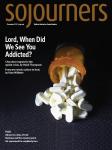I SPENT THE PAST several weeks worrying about hurricanes—and the maddening way some people keep denying any connection between these storms (aka extreme weather events) and climate change. (I have this mental picture of me throwing these people into a flooded Houston neighborhood and shouting, “Is that science enough for you!?”)
Anyway, as a result, I totally missed the release of The Nashville Statement. After some research, I realized that this important document has been insufficiently ridiculed by an award-winning humorist. But since Dave Chappelle won’t return my calls (or answer my emails, or reply to those notes I left on his bedside table when he was sleeping; he looks so peaceful ...), I’m going to give it a shot.
The statement reaffirms conservative evangelicals’ belief that marriage is between a man and a woman (and presumably their lawyer when, you know, it doesn’t work out half the time), despite the fact that no one was confused about their stance, or needed reminding that this particular limb of the body of Christ makes God blush with embarrassment whenever they come up in conversation. (I heard that God doesn’t even make eye contact on elevators anymore.)
Nor was anyone surprised that the statement came from the Bible Belt, a region known for churchgoers who think Jesus was simply off-message when he preached the Sermon on the Mount. In their view, Jesus should have stuck with the PowerPoint on personal salvation, not that whole thing about “those” people being blessed.
The statement originated in Nashville, but it could just as easily have come from Shreveport, La., or Tallahassee, Fla. I also would have accepted The Dallas-Fort Worth Statement, The Tuscaloosa Statement (Roll Tide!), or The From-My-Cold-Dead-Hands Statement.
The Brooklyn Statement, not so much.
The Nashville Statement was written by The Council on Biblical Manhood and Womanhood, an organization previously known for its pivotal role in maintaining galactic peace in the Star Wars universe. I didn’t realize it had social concerns on earth. Of course, you just know its original name was The Council on Biblical Manhood, but then somebody reported that “the gals in the office were feeling left out.”
“And we should get some ladies to sign the statement, too,” someone else probably remarked, belatedly, judging by the small number of women who actually signed the darn thing. (Of the 165 initial signatories, I counted only 16 women, not including Alistair and Ardel, who I wasn’t sure about.)
On the plus side, none of the signatories was Pat Robertson, a gay-shaming originalist whose selfless toil in the garden of prejudice and hate is always rewarding, but exhausting. Because of global warming, there always seems to be another natural disaster to blame on “homosexuals.” It’s hard to keep them all straight.
The statement has a “preamble” and lots of “articles,” no doubt modeled on the U.S. Constitution, a copy of which many Christian voters carry at all times, right next to their concealed-carry permit. Unlike the original Constitution, however, not a single slaveholder signed The Nashville Statement. The signers may have undocumented help around the house, people who have to take two buses to work and make only seven bucks an hour, but hey! There’s nothing wrong with that, right?
In essence, the statement simply states—and repeats 14 times, in case you weren’t paying attention—that the LGBTQ community is lesser in the eyes of God and should not be given the freedom to live and love like the good, normal people who judge them with such harshness. To be fair, the authors deserve credit for not painting with a broad brush; they make a point of including references to transgender people. But that probably raised questions from their constituency.
“What’s a ‘transgender’?”
You know, the bathroom people.”
“Oh, right.”
At press time, we couldn’t confirm if God agrees with any of this. I ran into God in an elevator recently, but I couldn’t make eye contact.

Got something to say about what you're reading? We value your feedback!

